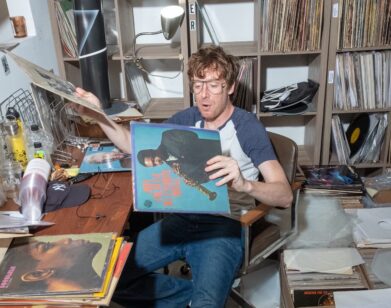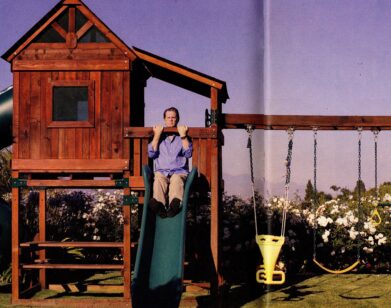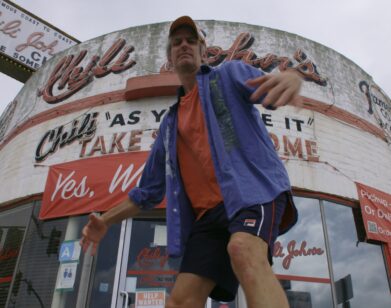Yo La Tengo’s Slow Fade

ABOVE: YO LA TENGO. IMAGE COURTESY OF CARLIE ARMSTRONG
Out of all the indie rock stalwarts (Sonic Youth, Guided By Voices, The Pixies, et al) Yo La Tengo are easily the best-adjusted and least scandalous of the lot. As was recently documented in Jesse Jarnow’s book Big Day Coming: Yo La Tengo and the Rise of Indie Rock, the band’s success, aside from consistently solid to brilliant albums and workmanlike dedication to live shows, stems from their decidedly un-rock and roll lifestyle. Formed in 1984, the enduring marriage of guitarist/vocalist Ira Kaplan and drummer Georgia Hubley, along with the lack of drugs/hotel trashing/in-fighting in their bio adds a layer of humble poignancy to their legacy. Kaplan and Hubley, and to certain extent bassist James McNew, are notoriously private and elusive to the press, which in this climate of all-access media is equally refreshing and infuriating.
While they never had their alt-rock crossover hit, Yo La Tengo’s new album Fade, available via Matador Records, finds the band alternating between grand orchestral arrangements and lush balladry, touching on themes of personal tragedy and mortality, culminating in their most personal record since 2000’s …And Then Nothing Turned Itself Inside Out.
DREW FORTUNE: How does a Yo La Tengo record take shape? Is it a blitzkrieg of songwriting or a gradual process?
IRA KAPLAN: [laughs] It’s a gradual blitzkrieg. We work slowly and unfocusedly for a while. Right now we’ve been practicing and playing these songs to get ready to play them live, and that’s pretty much what we’re going to be doing for the next year. It’s possible that for one reason or another we might need to get together and rehearse, and when we do, it’s also possible that screwing around, and just jamming, that might ultimately be a song. Those things, if they happen, will be sporadic. After a while, we realize that we’ve been doing Wheel tours or Buckminster Fuller documentaries, and that we need to start making a record. We start with a deadline; we’ve had this January 15th date for a long time, over a year in advance so we can work towards it, because we don’t write that quickly.
FORTUNE: How did [producer] John McEntire enter into Fade? Based on his body of work, it seems like a natural fit, but you had known him for years, correct?
KAPLAN: Yeah, It’s funny that we’ve known him for so long that to a certain extent, we don’t even know his body of work. We know the two bands he’s in [Tortoise and The Sea and Cake], and we have some records that he’s worked on, but if he wasn’t a friend of ours I think we might have pored over his resume a lot harder [laughs]. Just having known him so long, it just seemed like a natural idea and one that we trusted would be productive.
FORTUNE: Was recording in Chicago at Soma Studios good for creativity?
KAPLAN: We had a great time being there. We’ve moved all around, and basically from 1995, when we put out Electr-O-Pura, until now, all our records were recorded in Hoboken and mixed in Nashville, or recorded in Nashville and mixed in New York City. We have a lot of friends in Chicago, and it was great to actually get to see people. To be there for the greater part of the summer was great. You never really know what’s leading to what. I’m sure the fact that we were enjoying ourselves is there on the record somewhere.
FORTUNE: Do you know before recording what will be an Ira or Georgia song? Is it a gut feeling?
KAPLAN: We try to be open to letting anything change in the moment. As far as my lead or Georgia’s from song to song, it happens while we’re rehearsing. Sometimes it’s just the first person who starts singing. Things just kinda happen. The first song on the record, “Ohm,” initially was just Georgia singing in a very different form. As we worked on it, we came up with the idea of all three of us singing together.
FORTUNE: Fade, at least to my ears, is one of the more subdued and delicate Yo La Tengo records. It seems to be your dual nature, the quiet versus the loud. Which is a stronger impulse for you: Rocking out or the quieter moments?
KAPLAN: We like them all, which is why we do them all. That’s an interesting response. I don’t think that would necessarily be ours, to the record, but maybe it’s true. I don’t know.
FORTUNE: One of the pleasures of working with John must be the amazing toys at Soma Studios. Are you a big gearhead?
KAPLAN: I am not. That doesn’t mean that it wasn’t one of the pleasures of working at Soma, but I kind of straddle a couple of lines where I try to not be too wrapped up in that stuff. That’s a joke of a statement—if anyone looks at the pedalboard, I play my guitar through before it gets to the amp, but in my own head I’m not really that much of a gearhead.
FORTUNE: How was 2012 for you? Hurricane Sandy obviously hit pretty close to home for you guys.
KAPLAN: Yeah, it did. Our physical losses from it were completely manageable, but I think the real impact of it was more emotional. Maybe that’s because we didn’t lose that much, but to go from “It can’t happen” to “It did happen and can happen again,” that’s a big change. No matter how much we were warned, we’ve kind of had those warnings before, it’s never turned out as bad as they threatened. This time is was everything they threatened, and you feel like you’ve kind of lost the ground beneath you. I think the whole community feels that way.
FORTUNE: Is everyone still on pins and needles in a certain sense?
KAPLAN: I think when it rains or when the wind blows, there’s definitely a different relationship to it now. You’re reminded what you’re at the mercy of…
FORTUNE: With the release of Jesse Jarnow’s book, being a notoriously private band, why did 2012 feel like the right time to tell the story?
KAPLAN: Jesse approached us. That’s a question for him as much for us. For us, the question might be, why did we agree to participate? He initiated it, and I think mostly we were flattered that he was interested and thought that, other than cool—well, I’ll stick with cool—it would be cool to go from the kind of band that nobody had written a book about to the kind of band that somebody had written a book about. The opening ourselves up part was not our favorite part, and I’m not sure we did.
FORTUNE: It’s important to tell the Matador story and put that time and place into a book.
KAPLAN: I’m not so sure it is important. It’s nice that he thinks that somebody else thinks it is. It’s not like we were beating the bushes thinking that we have to find somebody to tell this story. I think all of us were definitely pleased that somebody did think it was an important job.
FORTUNE: What’s your relationship to modern music? Are you constantly seeking out new bands or do you look to the past?
KAPLAN: I’m not that connected with current music, and probably decreasingly. I’m only speaking for myself, and I think James is more of an omnivorous listener than Georgia or myself. The music we’re listening to does tend to be from the past. It’s funny you say that, that those are the two choices, being that there’s a lot of music that we’ve never heard before. It’s not like we’re just pulling out December’s Children by The Rolling Stones and listening to that again and again. We are listening to things we’ve never heard, but they do tend to be from the past.
FORTUNE: I thought 2012 was a good year for movies. I have to imagine you’re a film buff.
KAPLAN: Being so busy last year, I didn’t get to go as much as I wanted to.
FORTUNE: Any favorites off the top of your head?
KAPLAN: Luckily, I am still something of a list-keeper, so let’s not rely on the top of my head. I can access the list of movies I saw in 2012. A question of that importance requires a much more authoritative answer. Gerhardt Richter Painting was a big favorite. A Separation, oh, Tim and Eric’s Billion Dollar Movie. I thought they did a great job.
FORTUNE: [laughs] So you were the one who liked it?
KAPLAN: I thought it was great! I don’t know, maybe the people who didn’t like it didn’t like their TV show either. I loved their TV show, and I thought they made the transition to a movie better than almost anyone I can think of. Think about the Saturday Night Live skits that have tried to become movies, or The Kids In the Hall feature and The Simpsons and SpongeBob, I thought Tim and Eric was really good.
FORTUNE: What’s a perfect day for Ira Kaplan?
KAPLAN: I’m gonna not answer in the spirit of your question. A lot of it depends. We did the Hanukkah shows, and those are pretty exciting. There’s probably a little more work in them that makes it not a perfect day, but they’re so rewarding that it’s close enough. But when it was over, Georgia and I went away for a while and did as close to nothing as we could in a really beautiful setting. That was pretty great. I like doing things but I like not doing them too. If I can steal a movie in there somewhere as well, then so much the better.
FADE IS OUT NOW. YO LA TENGO WILL TOUR THROUGH MARCH, INCLUDING A SHOW FEBRUARY 16 AT TOWN HALL IN NEW YORK CITY. FOR MORE ON THE BAND, VISIT ITS WEBSITE.






